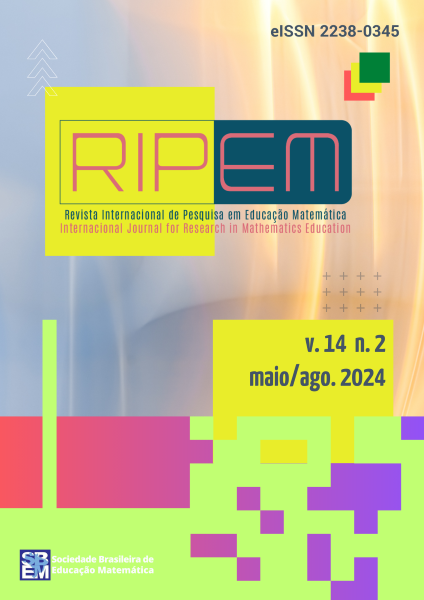Symbolic Interactionism and Advanced Mathematical Thinking in the study of Polynomial Functions and their Derivatives
DOI:
https://doi.org/10.37001/ripem.v14i2.3746Keywords:
Conceptual Definition, Conceptual Image, Symbolic Interactionism, Advanced Mathematical ThinkingAbstract
The article refers to a study carried out with students of Differential and Integral Calculus, 1st period of an Information Systems course. It is based on the constructs image and conceptual definition of Advanced Mathematical Thinking and aspects of Symbolic Interactionism. It aimed to understand how and in what way mathematical definitions are mobilized in discussions between students and teachers during presentations in a seminar. The analysis revealed discrepancies between the images and the conceptual definitions of polynomial functions and their derivatives, and contributed to the learning of Calculus concepts in the interactions between students and teachers.
Downloads
References
Almeida, M. C.; Barbosa, R. C., Musmanno, L. M. & Souza, N. P. (2023). A trajetória de uma gota: um relato de experiência com estudantes de Cálculo Diferencial e Integral. Educação Matemática Debate, 7(13), 1-16.
Amancio, D. T. & Sanzovo, D. T. (2020). Ensino de Matemática por meio das tecnologias digitais. Revista Educação Pública, 20(47), 1-5.
Blumer, H. (1980). A natureza do interacionismo simbólico. In: C. D. Mortensen. (Org.) Teoria da comunicação: textos básicos. (pp. 119-138). São Paulo, SP: Mosaico.
Carmo, P. F. & Igliori, S. B. C. (2020). Uma metanálise de dissertações e teses brasileiras que utilizaram a teoria do Pensamento Matemático Avançado. Educação Matemática Debate, 4(10), 1-26.
Dreyfus, T. (1991). Advanced Mathematical Thinking Processes. In: D. Tall. (Ed.). Advanced Mathematical Thinking. (pp. 25-41). Holanda: Kluwer Academic Publishers.
Edwards, B. S. & Ward, M. B. (2008). The role of mathematical definitions in Mathematics and in undergraduate Mathematics courses. In: M. Carlson & C. Rasmussen. (Ed.). Making the connection: research and teaching in undergraduate Mathematics Education MAA Notes #73. (pp. 223-232). Washington, DC: Mathematics Association of America.
Godino, J. D. & Llinares, S. (2000). El interaccionismo simbólico en Educación Matemática. Revista Educación Matemática, 12(1), 70-92.
Lobo, R. S. (2018). Análises acerca do tratamento da derivada no livro didático do Ensino Superior. Educação Matemática Debate, 2(6), 242-253.
Lopes, R. (2014). Definições matemáticas sobre funções e suas derivadas como um eixo de discussão para o ensino e a aprendizagem do Cálculo. 143f. Dissertação (Mestrado em Educação Matemática). Universidade Federal de Ouro Preto. Ouro Preto, MG.
Macêdo, J. A. & Gregor, I. C. S. (2020). Dificuldades nos processos de ensino e de aprendizagem de Cálculo Diferencial e Integral. Educação Matemática Debate, 4(10), 1-24.
Melo, L.; Giraldo, V. & Rosistolato, R. (2020). Significados e expectativas sobre docência compartilhada entre licenciandos em Matemática. Ensino da Matemática em Debate, 7(2), 149-180.
Melo, L.; Giraldo, V. & Rosistolato, R. (2021). Interações entre um professor da Educação Básica e um professor do Ensino Superior em uma experiência de docência compartilhada em Matemática. Sisyphus, 9(2), 105-131.
Minayo, M. C. S. & Costa, A. P. (2019). Técnicas que fazem uso da palavra, do olhar e da empatia: pesquisa qualitativa em ação. São Paulo, SP: Hucitec.
Oliveira, S. M. & Lopes, R. (2023). O Júri Simulado como metodologia ativa no curso de Licenciatura em Matemática. Educação Matemática Debate, 7(13), 1-17.
Oliveira, S. M. (2023). A Gincana Matemática como metodologia de ensino e aprendizagem: um relato de experiência à luz das teorias da aprendizagem significativa e experiencial. Revista Multidisciplinar do Vale do Jequitinhonha, 3(2), 1-15.
Rosa, C. M.; Alvarenga, K. B. & Santos, F. F. T. (2019). Desempenho acadêmico em Cálculo Diferencial e Integral: um estudo de caso. Revista Internacional de Educação Superior, 5, 1-16.
Tall, D. & Vinner, S. (1981). Concept image and concept definition in mathematics with particular reference to limits and continuity. Educational Studies in Mathematics, 12(2), 151-169.
Tall, D. (1991). The psychology of advanced mathematical thinking. (pp. 3-21). In: D. Tall. (Ed.). Advanced mathematical thinking (pp. 1-291). Dordrecht: Kluwer.
Tall, D. (1992). The transition to advanced mathematical thinking: functions, limits, infinity, and proof. In: D. A. Grows. (Ed.) Handbook of research on mathematics teaching and learning. (pp. 496). New York: Macmillan Publishing Company.
Tall, D. (1995). Cognitive growth in elementary and advanced mathematical thinking. In: Proceedings of 19th International Conference for the Psychology of Mathematics Education. (pp. 61-75). Recife, PE.
Torrente, C. R. & Reis, F. S. (2023). A mobilização de processos do Pensamento Matemático Avançado na resolução de questões da OBMEP. Revista Internacional de Pesquisa em Educação Matemática, 13(2), 1-22.
Vieira, A. R. L. (2021). História, legislação e análises: a monitoria dos cursos de Cálculo Diferencial e Integral em cursos de Engenharia. Caminhos da Educação Matemática em Revista, 11(3), 109-125.
Vinner, S. (1991). The role of definitions in the teaching and jearning of Mathematics. In: D Tall. (Ed.). Advanced Mathematical Thinking (pp. 65-81). Dordrecht, The Netherlands: Kluwer Academic Publishers.
Published
How to Cite
Issue
Section

This work is licensed under a Creative Commons Attribution-NonCommercial-ShareAlike 4.0 International License.








